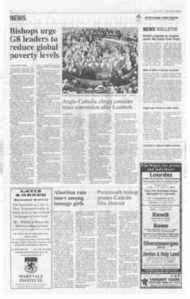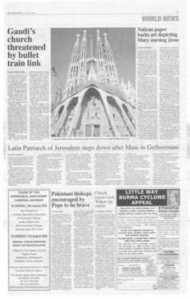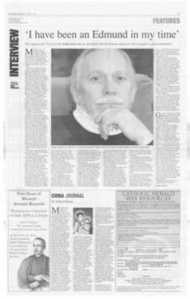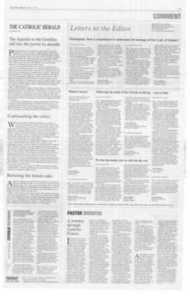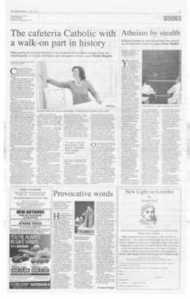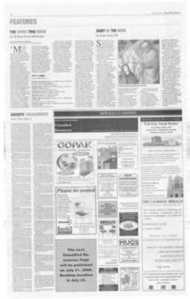Page 9, 27th June 2008
Page 9

Report an error
Noticed an error on this page?If you've noticed an error in this article please click here to report it.
Tags
Share
Related articles
No 'sponsored Religion' On The Other Tv
Radio And Tv
Concessions Made To Eurovision
Balanced And Attractive Schedule
Looking And Listening
All Catholics are superheroes in the making
In the hit television series Heroes ordinary people develop amazing special powers. Stratford Caldecott says the idea will be familiar to Catholics
What superpowers would you like to have? To be immortal, invulnerable, able to jump tall buildings or even fly? To be able to walk through walls? All of these and more are developed by characters in the popular sci-fi drama Heroes, currently showing on BBC Two and BBC Three. Genetic mutations have occurred and people all over the world are being born with extraordinary abilities. A similar premise lies behind many of the American comic-books. But unlike the X-Men, the Avengers, or the Justice League, the characters in Heroes do not band together, wear tight clothing and mask their faces to define their heroic identity. They mostly find their powers a burden or a problem, and hide them in order to seem "normal" again. Of course their lives are hardly a bed of roses, since in our fallen world, wherever there are superheroes there will also be supervillains. Not to mention the fact that some of the powers these fictional heroes acquire are genuinely inconvenient like the ability to make everyone around you die. Naturally, no possible extension of the theory of evolution would really explain the emergence of such powers, let alone the ability possessed by Hiro Nakamura to "bend the space-time continuum" by closing his eyes and concentrating really, really hard. In fact the word "evolution" seems to have replaced "magic" in most people's minds as a way of accounting for the impossible. Science in a more general sense is also used in this way. After all, as Arthur C Clarke once said "Any sufficiently advanced technology is indistinguishable from magic." Thus, in the recent Iron Man movie, Tony Stark is able to convert his company's military technology into a flying metal suit -a kind of red and gold equivalent of the magic armour worn by heroes of old. Batman has no powers of his own either: he is merely a disturbed acrobat with a cave full of gadgets. Spider-Man owes his powers to a radioactive spider bite, the Fantastic Four theirs to solar radiation. But don't give up too easily. Real science may not be able to give you magic powers, but there is another way. In fact there are two other ways. The first way is by becoming holy. There are plenty of reports of saints who can levitate or even fly, read minds, radiate light, heal illness and injury, and appear in several places at the same time. Padre Pio could do them all Patricia Treece in a book entitled The Sanctified Body has found similar well-attested stories from other religious traditions. She suggests such powers are not supernatural at all, but preternatural -that is, part of the normal human inheritance .forfeited when we fell from grace in Eden, but regained in rare cases by men and women who purify their bodies and souls. But, as in the comic books, there are dangers. Indian gurus warn us not to pursue these "siddhis", lest they distract us from the true path. Christian saints teach the same thing. Almost like a character in Heroes, St Teresa of Avila was embarrassed when she started to float off the ground, and asked her sisters to hold her down whenever it happened so no one would notice. The third and safest way to get superpowers is just to wait. According to the Church, all the powers I listed at the beginning of this article (Aquinas calls them agility, subtlety, impassibility, and so on) will one day be yours. All you have to do is die in a state of grace. They are the powers of the Resurrection Body, which we glimpse!' in the Resurrection of Christ. The Gospels'tell us that after his crucifixion Jesus appeared among his disciples in a locked room, that he was invulnerable, and that eventually he ascended to heaven. Scripture tells us that in the Resurrection those who are united with Christ will become like him. an But we are impatient, d our imagination runs ahead of us. In Eden we were due to become immortal but we messed things up by trying to be "like gods". So the current popularity of superhero fantasies should be no surprise. In real life we feel powerless against growing technological dangers. Our culture is obsessed with images, especially images of ourselves as we would like to be. We believe in the unlimited potential of science while the idea of evolution suggests the human race may be only a stepping stone to something else. Superheroes show us what we could become (whether good or evil), projected on to a big screen. In the movie The Incredible Hulk Bruce Banner is the scientist trying to suppress his rage, yet the huge green creature that he becomes possesses the heart of a child. We see the contrast when he confronts a monster of similar power but evil intent. In this case the soldier who becomes the Abomination has actively sought the power that was given to the Hulk, and the result is a terrifying projection of his own ego, unredeemed by love. By sacrificing himself to become capable of defeating the monster, Bruce learns to accept and integrate his own power. The appeal of the comics is the "true story" at their heart, the story of how we (particularly, I suppose, we adolescent boys) learn to cope with power and responsibility. The prototype of all these heroes is Superman himself, the last son of Krypton, KalEl. Invented by two Jewish writers on the eve of the Second World War (El is an Old,Testament term for divine power), he seems designed as an answer to Hitler, to show that power need not be used for evil ends. Morally the purest of all heroes, as well as the mightiest. Superman's power comes from above, but his family values are from a farm in Kansas. Those values tell him that every life is worth saving, even at the cost of one's own. It is his faithfulness to that cOde, not his special abilities, that make him a hero. Stripped of his powers by green Kryptonite, yet still fighting to save others, he earns our respect. Even in a comic book, what we are looking for is more than superpowers, Strao`ord Caldecott directs the Centre for Faith and Culture in 0Aford for Thomas More College of Liberal Arts
blog comments powered by Disqus



